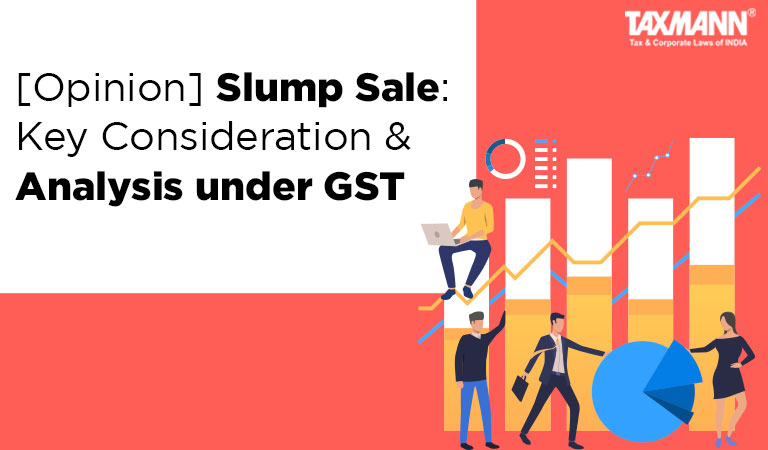[Opinion] Slump Sale: Key Consideration & Analysis under GST
- Blog|News|GST & Customs|
- 3 Min Read
- By Taxmann
- |
- Last Updated on 10 November, 2022

Surjeet Singh Negi – [2022] 144 taxmann.com 159 (Article)
Definition
The term “Slump Sale” is defined under the provisions of the Income-tax Act, 1961 (‘the Act’), wherein transfer of a business undertaking as a going concern for a lump sum consideration qualifies as a slump sale.
Slump sale implies transfer of “undertaking” as a whole
As per Section 2(42C) of the Act defines slump sale to mean transfer of one or more undertakings as a result of the sale for a lump sum consideration without values being assigned to individual assets and liabilities in such sales. For this purpose,
Explanation 1 to clause (19AA) of section 2 of the Act, explains that an “undertaking” shall include any part of an undertaking, or a unit or division of an undertaking or a business activity taken as a whole, but does not include individual assets or liabilities or any combination thereof not constituting a business activity“.
Accordingly, so long as the subject matter of transfer is such that it answers even to the requirement of “part of the undertaking”, such that the transferee is able to step into the shoes of transferor in the matter of conduct of business on a going concern basis, the condition of “undertaking” should be regarded as satisfied. In other words, the “undertaking” should be ‘going concern’ and the undertaking so transferred should be such that it is capable of being run as independent “business” as a whole.
The key test of slump sale i.e. transfer of the undertaking on a going concern basis
The provisions of the Act relating to slump sale and judicial precedents require transfer of the undertaking on a going concern basis such that the entire business activity is transferred and capable of carried out as such.
A business undertaking is considered as a going concern which includes all rights, assets, contingent or definite, corporeal and incorporeal and all interest in advantage, present or future. Therefore, a unit should be regarded as an undertaking, transferred on a going concern basis when it has:
- Its Capital/funds/investment (s);
- Infrastructure (i.e. Land & Building, plant & machinery, office equipment etc.) required for rendering services;
- Personnel(s) / resource(s) to provide services etc.
Legal Provisions under GST with respect to slump sale
- Section 7 of Central Goods & Services Tax Act’2017 (“CGST Act”) provides for scope of supply. The relevant extracts of the section has been provided below for reference:
“(1) For the purposes of this Act, the expression “supply” includes,-
(a) all forms of supply of goods or services or both such as sale, transfer, barter, exchange, licence, rental, lease or disposal made or agreed to be made for a consideration by a person in the course or furtherance of business;
………………………..
……………………….
(1A) where certain activities or transactions constitute a supply in accordance with the provisions of sub-section (1), they shall be treated either as supply of goods or supply of services as referred to in Schedule II.”
The above criteria of scope of supply implies that the activity undertaken shall be an action which takes place in the course of regular conduct of business and such as sale should have the effect on furtherance of the business. Therefore the activity to be called as supply should amount to conduct of business. Apparently, the transfer of a going concern, either as a whole or an independent part thereof, for a lump sum consideration does not constitute an activity taking place in course or furtherance of business. However the word ‘includes’ has been used in Section 7(1) above has vide meaning of expression ‘in course or furtherance of business’. Therefore in the case of transfer as a going concern even if such act does not constitutes an activity in regular course of business, the activity may still qualify to be termed as a supply.
Click Here To Read The Full Article
Disclaimer: The content/information published on the website is only for general information of the user and shall not be construed as legal advice. While the Taxmann has exercised reasonable efforts to ensure the veracity of information/content published, Taxmann shall be under no liability in any manner whatsoever for incorrect information, if any.

Taxmann Publications has a dedicated in-house Research & Editorial Team. This team consists of a team of Chartered Accountants, Company Secretaries, and Lawyers. This team works under the guidance and supervision of editor-in-chief Mr Rakesh Bhargava.
The Research and Editorial Team is responsible for developing reliable and accurate content for the readers. The team follows the six-sigma approach to achieve the benchmark of zero error in its publications and research platforms. The team ensures that the following publication guidelines are thoroughly followed while developing the content:
- The statutory material is obtained only from the authorized and reliable sources
- All the latest developments in the judicial and legislative fields are covered
- Prepare the analytical write-ups on current, controversial, and important issues to help the readers to understand the concept and its implications
- Every content published by Taxmann is complete, accurate and lucid
- All evidence-based statements are supported with proper reference to Section, Circular No., Notification No. or citations
- The golden rules of grammar, style and consistency are thoroughly followed
- Font and size that’s easy to read and remain consistent across all imprint and digital publications are applied



 CA | CS | CMA
CA | CS | CMA
